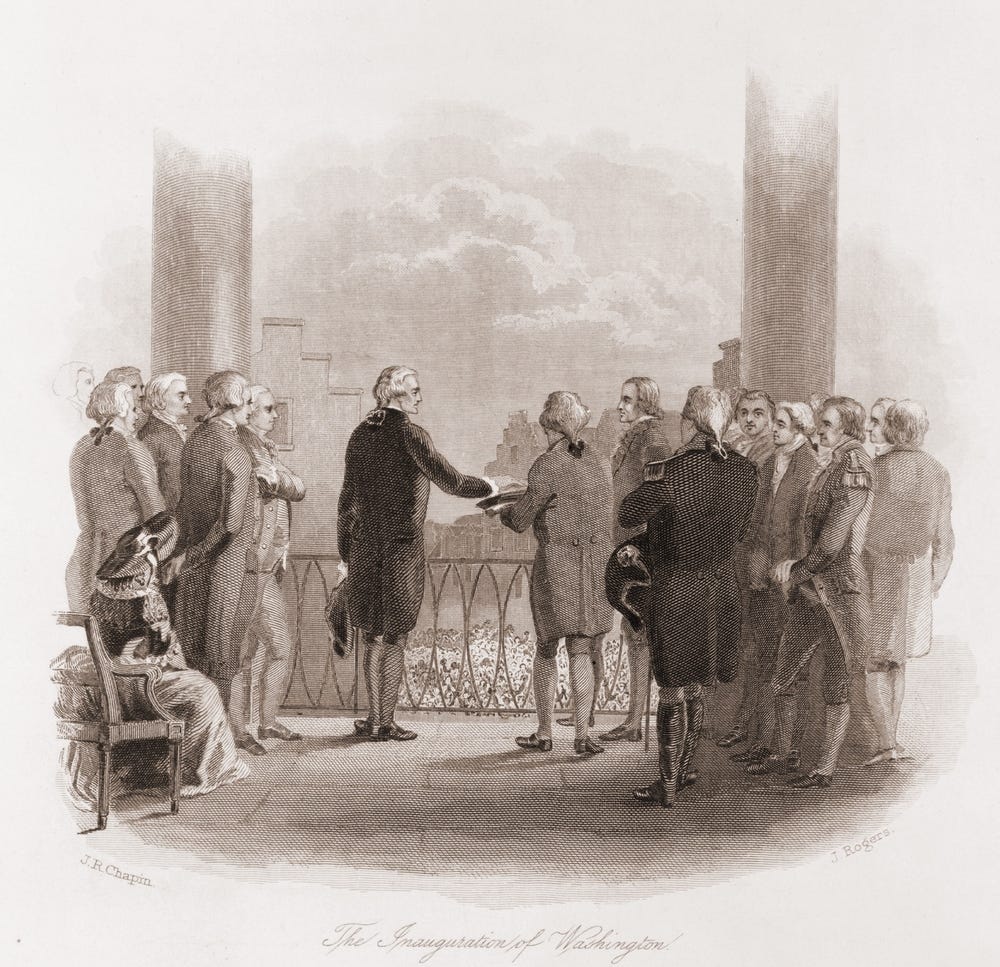E-Pluribus | July 11, 2022
Book banning, governors in the culture war, and a call for the refounding of America.
A round-up of the latest and best writing and musings on the rise of illiberalism in the public discourse:
David French: The Dangerous Lesson of Book Bans in Public School Libraries
Most would agree that not all books are appropriate for every audience, but how to accomplish that end in public schools and libraries in a way that does not run afoul of the First Amendment has been a source of contention for many years. Writing for Reason, David French recalls some lesser known Supreme Court cases from decades ago that may gain new prominence as the book banning debate is renewed in a new generation.
In the Pico ruling, the Court quoted its earlier judgment in Tinker v. Des Moines (1969): "In our system, students may not be regarded as closed-circuit recipients of only that which the State chooses to communicate….School officials cannot suppress 'expressions of feeling with which they do not wish to contend.'" The Court added in Pico: "In sum, just as access to ideas makes it possible for citizens generally to exercise their rights of free speech and press in a meaningful manner, such access prepares students for active and effective participation in the pluralistic, often contentious society in which they will soon be adult members."
In those sentences, Justice William J. Brennan Jr. perfectly captured the problem with book bans. No, it's not that any given book should be on the shelves. There are, for example, books that are either too explicit for young children or explicit enough that they should be viewed and checked out only with parental permission. It's that book bans inhibit a core function of public education. They teach students that they should be protected from offensive ideas rather than how to engage and grapple with concepts they may not like.
To borrow a phrase from Greg Lukianoff, president of the Foundation for Individual Rights and Expression, book bans are part of unlearning liberty. The process of American education is inseparable from the process of building American citizens, whether those citizens are educated in private schools, home schools, or public schools. It's sometimes tempting to try to avoid cultural conflicts by asking schools to stick to the basics, such as reading, writing, and arithmetic. But one of those "basics" is preparing young people for "active and effective participation" in American pluralism.
As a practical matter, that means that book removal should be a last resort, both because limiting access to content can implicate students' ability to receive ideas and because of the message of the removal itself. It teaches a lesson—that the response to a challenging thought is to challenge the expression itself rather than the idea.
That does not mean that anything goes. As a matter of common sense, elementary school libraries should have different standards from high schools. And some books are so graphic that parents should have a say in whether even their older child can check them out.
But the bottom line remains. When school boards and principals hear challenges to books or consider restrictions on curriculum, they need to understand the very purpose of their educational project. It is not, as the Island Trees district declared back in 1976, to protect children from "moral danger." It is to prepare citizens for pluralism. Our nation's schools must not suppress "expressions of feeling with which they do not wish to contend."
Read it all here.
Steven Malanga: The Culture War Between the States
Governors are often the lead salespeople for their states, hoping to draw in new businesses to provide jobs and economic growth. At City Journal, Steven Malanga explores a current trend of governors using culture war issues as a selling point to appeal to both sides of the ideological divide.
For decades, states have competed with one another for businesses by touting local economic advantages in areas like taxation, development incentives, workforce quality, and regulatory policy. Occasionally, states would also pitch themselves to firms on more general principles like quality of life and public investment in schools and infrastructure. Now the battle for jobs and for wealthier residents has taken a new turn, reflecting the increasingly intense cultural wars playing out in America. Facing a steadily more difficult economic battlefield, governors of Democratic-led states are pitching businesses based on social issues: access to abortion, transgender rights, and voting laws. Blue-state officials are hoping to lure firms that object to red-state legislation restricting abortion, revising voting practices, or banning biological males from competing in female athletics. The stakes are high because business and residential migratory patterns, and the economic gains that go with them, have shifted massively toward Republican-led states in post-pandemic America.
[ . . . ]
The Supreme Court’s Dobbs decision overturning Roe v. Wade seems to have been a catalyzing force among Democratic governors. New Jersey governor Phil Murphy, who recently signed legislation extending legal protections to women who come to his state for abortions, has reached out to dozens of companies in states with abortion restrictions, inviting them to relocate to Jersey. In a letter to firms, Murphy declared that the Dobbs decision would have a “chilling effect . . . on your ability to attract and retain top female talent by being located in a state which has refused to recognize women’s reproductive freedom.” Later, the governor’s office said of the letter, “Governor Murphy encourages businesses looking to stand with their employees to look to New Jersey, a state where they can be confident that the rights of women, the LGBTQIA+ community, and voters will always be protected.”
[ . . . ]
Republicans have punched back at this outreach. A DeSantis spokesperson called Newsom’s ad a “pathetic smear” and, pointing to migration numbers from California, said people are fleeing “the hellhole [Newsome] created in his state to come to Florida.” The Republican National Committee, meanwhile, issued a statement saying that the Newsom ads “remind Floridians just how much they don’t want to move to California.” Meanwhile, a spokesperson for Georgia governor Brian Kemp said of the Murphy letter: “A sitting governor wouldn’t be spending his time making this type of desperate outreach if business was also booming in his state. He’d be celebrating the announcement of multibillion dollar projects and thousands of new jobs with quality companies — like Gov. Kemp has had the privilege of doing several times already this year.”
Read the whole thing.
Bari Weiss: The New Founders America Needs
In his Gettysburg Address, Abraham Lincoln envisioned a “new birth of freedom” for the United States thanks to the sacrifice of those brave soldiers who gave the “last full measure of devotion.” In an admittedly less dramatic setting, Bari Weiss recently addressed the inaugural group of students at the brand new University of Austin and urged them to embrace a role as “new founders” who can help rekindle the revolutionary, freedom-loving spirit that has made America the greatest country on earth.
What has become obvious to anyone paying attention is that we are living through a kind of revolution.
It is not a physical one. As my friend Abe Greenwald wrote in Commentary Magazine, it “is not being fought within the physical limits of a battlefield. It is instead happening all around us and directly to us. It is redefining our culture, our media, and giving new shape to our public and private institutions. It is remaking the nation before our eyes.”
In other words, this is a revolution of culture. A revolution of ideas.
For far too long, it resisted description. The revolution’s proponents went from pretending it didn’t exist and insisting that those who suggested it did were wearing tinfoil hats . . . to declaring it was here, and it was excellent, and that if you didn’t get on board you were a bigot and a bad person.
Others, meantime, have tried to deny its existence because they are scared of its implications. Or because what’s happening on the right is also scary. They point to the rise of QAnon and the spread of conspiracy theories about stolen elections and members of Congress who talk casually about Jewish space lasers and insist that any one who suggests that the problem is anywhere but the right is basically abetting the rise of fascism. As if there can’t be two bad things happening at once.
Others pretend away ideological revolution for more craven reasons: Because to see it would be to give up too much status. Too much prestige. To really see it—and to reckon with how completely it has won—might mean giving up on Yale. Or Harvard.
But deny it as they might, it is very much here.
Indeed, this soft, cultural revolution is, I believe, the biggest untold story in America right now. It is one that is happening right under our noses and it promises to reshape the country. It already has.
Read it all.
Around Twitter
A few comments from Twitter users on Item #3 above by Bari Weiss:
UC Berkeley professor Scott Galloway questions Elon Musk’s commitment to free speech for blocking him on Twitter:
And finally, via Andrew Sullivan, new frontiers in gender ideology:











